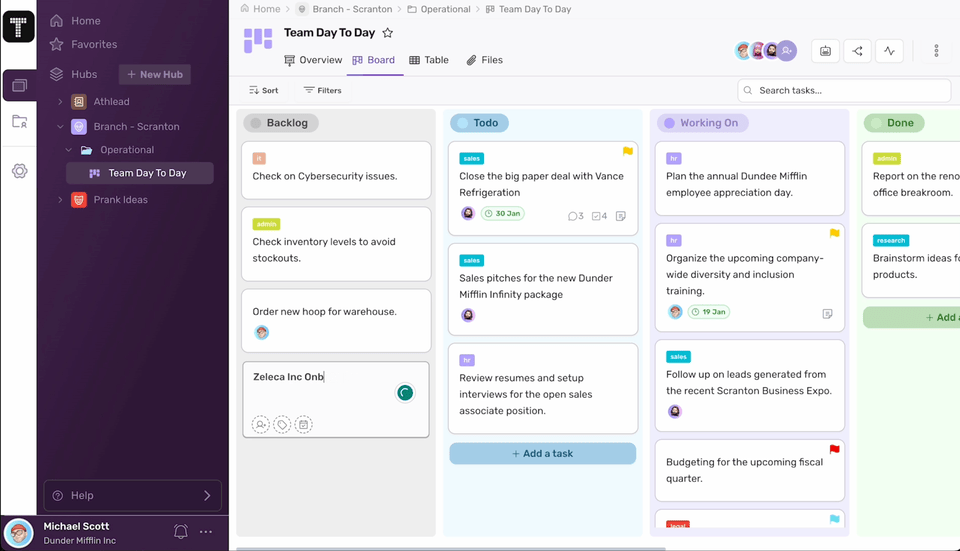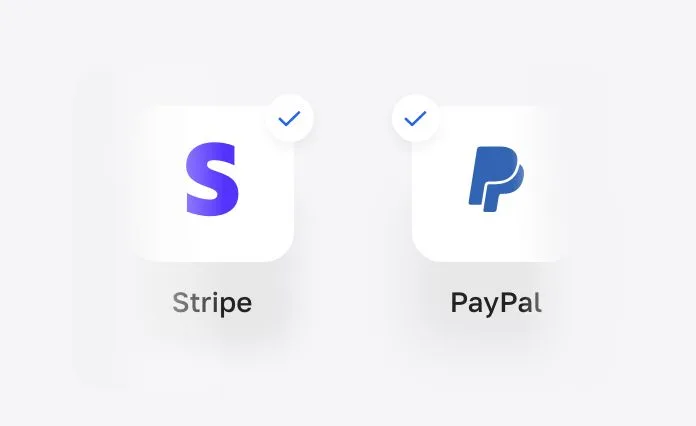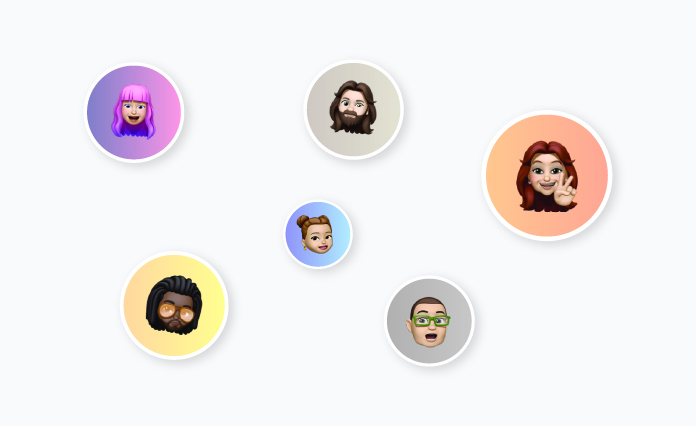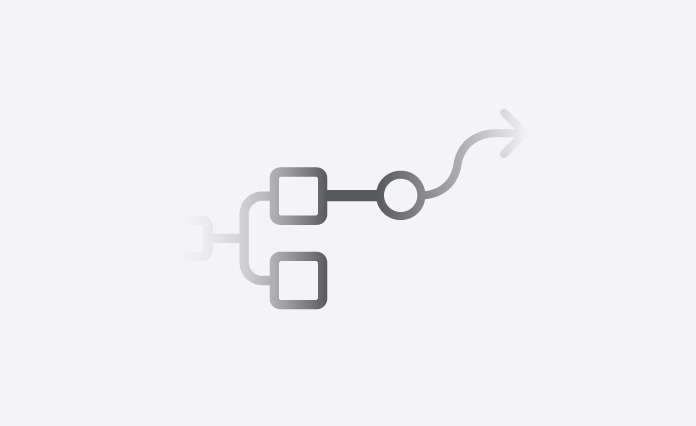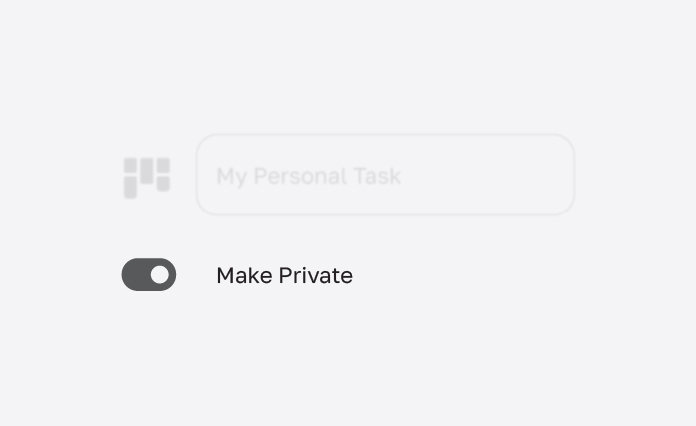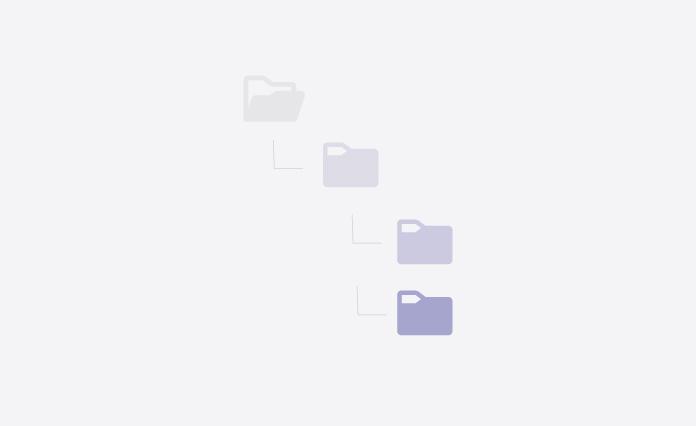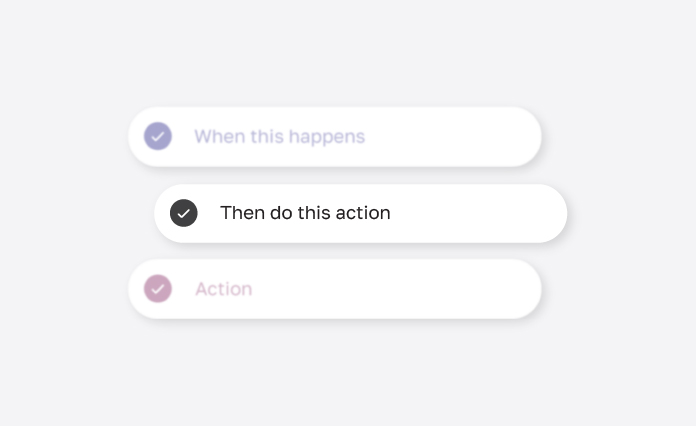Project Management Software Defined:
Project management software is a digital compass, that guides teams through the labyrinth of project execution. It’s more than a tool; it’s a strategic asset that empowers businesses to navigate complexity with finesse and precision.
Master the Art of Planning:
Project planning is the cornerstone of success, and Project Management Software (PMS) offers a suite of tools to orchestrate this crucial phase:
Visualize the Journey:
Gantt charts and Kanban boards serve as the canvas upon which project roadmaps are painted. They provide stakeholders with a visual representation of project timelines, dependencies, and milestones, fostering alignment and clarity.
Prioritize with Precision:
Task prioritization is akin to conducting an orchestra, where each element must harmonize seamlessly. Project Management Software enables project managers to set clear priorities, establish task dependencies, and allocate resources judiciously, ensuring optimal workflow efficiency.
Embrace Repeatability:
The mantra of “work smarter, not harder” resonates deeply in project management. Project Management Software allows teams to create reusable project templates that encapsulate best practices and standardized workflows, promoting consistency and efficiency across projects.
Forecast Like a Pro:
Resource management is akin to navigating stormy seas, requiring foresight and agility. Project Management Software equips project managers with robust resource management tools for accurate capacity planning, enabling teams to navigate choppy waters with confidence.
Foster Connection, Cultivate Client Delight:
Effective communication lies at the heart of successful project management, and Project Management Software serves as the conduit through which collaboration thrives:
Centralized Communication Hub:
In today’s interconnected world, real-time communication is non-negotiable. Project Management Software serves as a centralized hub where team members and clients converge, share updates, exchange ideas, and collaborate seamlessly, regardless of geographical barriers.
Seamless Feedback Loops:
Feedback is the lifeblood of continuous improvement, and PMS streamlines the feedback loop by providing structured channels for client input and team collaboration. By facilitating timely feedback integration, PMS fosters a culture of responsiveness and adaptability.
Mobile App Freedom:
The modern workforce is increasingly mobile, and Project Management Software caters to this reality by offering mobile applications that empower users to stay connected and productive on the go. Whether accessing project updates, reviewing documents, or participating in discussions, team members can remain engaged and informed irrespective of their location.
Client Portals:
Transparency is paramount in client relations, and PMS offers dedicated client portals that provide stakeholders with real-time visibility into project progress, deliverables, and milestones. By granting clients secure access to pertinent project information, Project Management Software fosters trust, enhances transparency, and cultivates client satisfaction.
Accelerate Project Delivery:
Time is of the essence in project management, and Project Management Software catalyzes efficient project delivery:
Automated Workflows:
Manual processes are relics of the past, and Project Management Software automates routine tasks to streamline project workflows and minimize delays. By orchestrating task dependencies, automating repetitive processes, and enforcing workflow standards, PMS ensures projects stay on track and deadlines are met with precision.
Agile Methodologies:
Agile is more than just a buzzword; it’s a mindset that champions adaptability, collaboration, and iterative development. PMS embraces agile methodologies by providing agile-friendly features such as sprint planning, backlog management, and burndown charts, enabling teams to respond nimbly to changing requirements and deliver value incrementally.
Built-in Time Tracking:
Time is a finite resource, and effective time management is paramount in project delivery. Project Management Software offers built-in time-tracking functionalities that empower teams to monitor time spent on tasks, track billable hours, and identify opportunities for optimization. By gaining granular insights into time allocation, teams can optimize resource utilization and maximize productivity.
Resource Optimization:
Human capital is the cornerstone of project success, and PMS facilitates optimal resource allocation to maximize efficiency:
Skills Matching:
PMS enables project managers to match the right skills to the right tasks, ensuring that team members are deployed in roles where they can contribute most effectively.
Capacity Planning:
Anticipating resource availability is essential for project planning, and Project Management Software provides tools for accurate capacity planning. By forecasting resource demand and availability, teams can proactively address resource constraints and mitigate project risks.
Performance Monitoring:
Continuous performance monitoring is key to identifying inefficiencies and optimizing resource utilization. PMS offers dashboards and reporting tools that provide real-time insights into resource performance, enabling teams to course-correct and drive continuous improvement.
Finding Your Perfect Project Management Software Fit:
Selecting the right PMS is akin to finding a tailored suit—it should fit your unique needs and preferences like a glove. Let’s explore the factors to consider when selecting a PMS:
Team Size:
Whether you’re a one-person army or part of a sprawling enterprise, the scalability and flexibility of the PMS are paramount:
Small Teams:
For lean startups and small teams, lightweight and intuitive Project Management Software solutions are ideal. Look for tools that offer essential project management features without overwhelming complexity.
Medium-Sized Teams:
As your team grows, scalability becomes a priority. Choose a PMS that can accommodate growing team sizes and evolving project requirements without compromising performance.
Large Enterprises:
Enterprise-grade Project Management Software solutions offer robust features, advanced security, and scalability to meet the complex needs of large organizations. Look for tools with enterprise-level support, customizable workflows, and integrations with existing systems.
Project Types:
Every project is unique, and the ideal PMS should adapt to diverse project requirements:
Creative Projects:
For agencies and creative teams, PMS solutions with robust collaboration features, asset management capabilities, and support for iterative workflows are essential.
Engineering Projects:
Engineering projects often involve intricate dependencies, complex timelines, and cross-functional collaboration. Look for PMS solutions with advanced scheduling tools, resource management features, and support for agile methodologies.
Construction Projects:
Construction projects require tools that can handle large-scale projects, resource-intensive tasks, and complex stakeholder coordination. Choose Project Management Software solutions with specialized features for construction project management, such as blueprint management, progress tracking, and compliance management.
Budget:
Budget constraints can influence your choice of PMS, but remember that value outweighs cost in the long run:
Free or Open-Source Solutions:
If you’re bootstrapping your project or operating on a shoestring budget, free or open-source Project Management Software solutions can provide essential project management features without breaking the bank. However, be mindful of limitations in terms of scalability, support, and customization.
Affordable Solutions:
Many Project Management Software vendors offer affordable subscription plans tailored to the needs of small and medium-sized businesses. Look for solutions that strike a balance between cost-effectiveness and feature richness, ensuring that you get the most bang for your buck.
Premium Solutions:
For organizations with larger budgets and complex project requirements, premium Project Management Software solutions offer advanced features, personalized support, and enterprise-grade security. While the upfront cost may be higher, the long-term benefits in terms of productivity, efficiency, and scalability justify the investment.
Industry:
Some industries have unique requirements that necessitate specialized Project Management Software solutions tailored to their specific needs:
Healthcare:
Healthcare organizations require PMS solutions that comply with strict regulatory standards, such as HIPAA compliance. Look for Project Management Software solutions with robust security features, patient data protection measures, and integrations with electronic health record (EHR) systems.
Finance:
Financial institutions deal with sensitive financial data and stringent compliance requirements. Choose PMS solutions that offer advanced security features, audit trails, and encryption capabilities to safeguard financial information and ensure regulatory compliance.
Manufacturing:
Manufacturing projects involve complex supply chains, production processes, and quality control measures. Look for Project Management Software solutions with features tailored to manufacturing project management, such as inventory management, production scheduling, and product lifecycle management (PLM) integration.
Beyond Basic Management: Enter the All-in-One Arena:
While standalone project management solutions offer valuable features, they may lack the integration and synergy required for holistic business management. All-in-one platforms like Teamhub offer seamless integration of project management with other key business functions, such as sales, invoicing, and client service. Let’s explore the benefits of all-in-one Project Management Software solutions:
Streamlined Workflows:
All-in-one PMS solutions eliminate data silos and streamline workflows by integrating project management with other business functions. Whether it’s lead management, client communication, or invoicing, all processes are seamlessly interconnected, enabling smoother collaboration and more efficient operations.
Holistic View:
By consolidating project management and other business functions into a single platform, all-in-one PMS solutions provide a holistic view of business operations. Decision-makers gain real-time insights into project performance, client relationships, and financial metrics, empowering them to make informed decisions and drive business growth.
Empowered Team:
All-in-one Project Management Software solutions equip teams with a unified toolset for all client-related tasks, from project management to sales to invoicing. By eliminating the need for multiple disjointed tools, teams can focus on delivering value to clients without the friction of switching between different applications.
Data-Driven Decisions:
With integrated reporting and analytics capabilities, all-in-one Project Management Software solutions offer powerful insights into business performance. Whether it’s project profitability, client retention rates, or sales pipeline health, decision-makers have access to actionable data that drives strategic decision-making and business optimization.
Unveiling the Industry-Specific Gems:
Different industries have unique requirements when it comes to project management software. Let’s explore how Project Management Software solutions cater to the specific needs of various industries:
Marketing Agencies:
Marketing agencies operate in a fast-paced environment characterized by tight deadlines, creative collaboration, and client feedback loops. Project Management Software solutions tailored to marketing agencies offer features such as:
- Campaign Management: From ideation to execution, Project Management Software solutions for marketing agencies facilitate end-to-end campaign management, including task assignment, content creation, and performance tracking.
- Client Collaboration: Seamless client collaboration is essential for marketing agencies, and PMS solutions provide dedicated client portals, feedback loops, and approval workflows to streamline client communication and ensure satisfaction.
- Resource Allocation: Marketing projects often involve interdisciplinary teams, and Project Management Software solutions offer resource allocation features that enable project managers to assign tasks, track progress, and optimize resource utilization for maximum efficiency.
Consulting Firms:
Consulting firms thrive on collaboration, expertise, and client relationships. Project Management Software solutions tailored to consulting firms offer features such as:
- Project Planning: Consulting projects vary in scope and complexity, and Project Management Software solutions provide project planning tools that enable consultants to define project objectives, allocate resources, and set milestones effectively.
- Client Engagement: Consulting projects often require close collaboration with clients, and Project Management Software solutions facilitate client engagement through features such as client portals, document sharing, and feedback loops.
- Time and Expense Tracking: Consulting firms bill clients based on billable hours and expenses incurred, and PMS solutions offer time tracking and expense management features that enable consultants to track billable hours, submit expense reports, and generate accurate invoices.
Architecture Studios:
Architecture projects demand precision, creativity, and collaboration. PMS solutions tailored to architecture studios offer features such as:
- Design Management: Architecture projects involve intricate design processes, and Project Management Software solutions provide design management tools that enable architects to create, revise, and collaborate on design documents effectively.
- Project Visualization: Visualizing project progress is crucial in architecture, and PMS solutions offer visualization tools such as Gantt charts, 3D models, and project timelines that enable architects to track project milestones and dependencies.
- Client Communication: Architects collaborate closely with clients throughout the design and construction process, and Project Management Software solutions facilitate client communication through features such as client portals, virtual walkthroughs, and design presentations.
Software Development Teams:
Software development projects require agility, collaboration, and technical expertise. Project Management Software solutions tailored to software development teams offer features such as:
- Agile Project Management: Software development teams embrace agile methodologies such as Scrum and Kanban, and Project Management Software solutions offer agile project management tools that facilitate sprint planning, backlog grooming, and burndown chart tracking.
- Version Control: Software development projects involve version-controlled code repositories, and Project Management Software solutions integrate with version control systems such as Git and Subversion to ensure code integrity, collaboration, and traceability.
- Bug Tracking: Software development projects encounter bugs and issues during development, and PMS solutions offer bug tracking and issue management features that enable developers to report, prioritize, and resolve issues efficiently.
Unlocking the Next Level: Emerging Trends in Project Management Software
The landscape of project management software is constantly evolving, driven by technological advancements and changing market dynamics. Let’s explore some of the emerging trends shaping the future of Project Management Software:
Artificial Intelligence (AI):
Artificial intelligence (AI) is revolutionizing project management by augmenting human capabilities and automating routine tasks. Some of the key AI-driven features in Project Management Software include:
Predictive Analytics:
AI algorithms analyze historical project data to identify patterns, trends, and potential risks, enabling project managers to make informed decisions and mitigate project delays.
Automated Task Recommendations:
AI-powered assistants suggest task priorities, resource allocations, and workflow optimizations based on real-time project data, streamlining project execution and maximizing team productivity.
Natural Language Processing (NLP):
NLP capabilities enable Project Management Software solutions to parse and interpret natural language inputs from users, facilitating voice commands, chatbots, and conversational interfaces that enhance user experience and accessibility.
Machine Learning (ML):
Machine learning (ML) algorithms enable Project Management Software solutions to learn from past project data and adapt to changing project dynamics. Some of the key ML-driven features in PMS include:
Adaptive Project Planning:
ML algorithms analyze project performance data to dynamically adjust project schedules, resource allocations, and task priorities in real time, ensuring project delivery stays on track despite changing circumstances.
Personalized User Experiences:
ML algorithms analyze user interactions and preferences to tailor Project Management Software interfaces, dashboards, and recommendations to individual user needs, enhancing user satisfaction and adoption.
Enhanced Reporting and Insights:
ML algorithms uncover hidden patterns, correlations, and insights in project data that human analysts may overlook, enabling Project Management Software users to make data-driven decisions and optimize project performance.
Automation:
Automation is a cornerstone of modern project management, enabling teams to streamline workflows, reduce manual errors, and focus on value-added activities. Some of the key automation capabilities in PMS include:
Automated Data Entry and Reporting:
PMS solutions automate data entry tasks such as timesheet submissions, progress updates, and status reports, freeing up valuable time for project teams to focus on project delivery.
Automated Notifications and Reminders:
PMS solutions automate notifications, reminders, and alerts for upcoming deadlines, task assignments, and milestone achievements, ensuring that team members stay informed and proactive.
Automated Approval Workflows:
PMS solutions automate approval workflows for project deliverables, change requests, and expense reports, streamlining decision-making processes and reducing administrative overhead.
The Power of Implementation: Tips for Success
Selecting the right PMS is just the first step; successful implementation is crucial to unlocking its full potential. Here are some tips for successful PMS implementation:
Change Management:
Prepare your team for the transition by clearly communicating the benefits of the new PMS, providing comprehensive training, and addressing any concerns or resistance to change.
Customization:
Tailor the PMS to your organization’s unique workflows, processes, and terminology to maximize user adoption and efficiency.
Data Migration:
Ensure a smooth transition by accurately migrating existing project data, documents, and configurations from legacy systems to the new PMS, minimizing disruptions and preserving historical project information.
Ongoing Support:
Provide ongoing support, training, and resources to help users navigate the new PMS, troubleshoot issues, and maximize productivity.
Expert Insights and Real-world Success Stories
Hearing from industry leaders and satisfied clients can provide valuable insights into the benefits of PMS and its impact on business success:
- “Before Teamhub, our projects were characterized by chaos, missed deadlines, and frustrated clients. With Teamhub, we gained visibility, control, and collaboration, leading to happier clients and increased revenue.” – Sarah Jones, CEO of Marketing Agency
- “Implementing Teamhub transformed our software development process, enabling us to deliver high-quality software on time and within budget consistently. It’s a game-changer for our team and our clients.” – David Lee, CTO of Software Development Company
Embrace the Future: Your Transformative Journey Awaits
The question “What is project management software?” is no longer a mere curiosity; it’s a gateway to a future of efficiency, collaboration, and success. Whether you’re a small startup, a growing enterprise, or an established industry leader, embracing the power of PMS can unlock hidden potential and propel your business to new heights.

